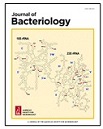Latest Publications
SpoIIQ-dependent localization of SpoIIE contributes to septal stability and compartmentalization during the engulfment stage of Bacillus subtilis sporulation
 Behzad Dehghani, Christopher D. A. Rodrigues
Behzad Dehghani, Christopher D. A. Rodrigues
During spore development in bacteria, a polar septum separates two transcriptionally distinct cellular compartments, the mother cell and the forespore. The conserved serine phosphatase SpoIIE is known for its critical role in the formation of this septum and activation of compartment-specific transcription in the forespore. Signaling between the mother cell and forespore then leads to activation of mother cell transcription and a phagocytic-like process called engulfment, which involves dramatic remodeling of the septum and requires a balance between peptidoglycan synthesis and hydrolysis to ensure septal stability and compartmentalization. Using Bacillus subtilis, we identify an additional role for SpoIIE in maintaining septal stability and compartmentalization at the onset of engulfment. Our data support a model whereby SpoIIE and its interactions with the peptidoglycan synthetic machinery contribute to the stabilization of the asymmetric septum early in engulfment, thereby ensuring compartmentalization during spore development.
